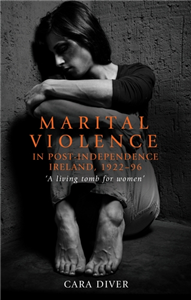Marital violence in post-independence Ireland, 1922–96
'A living tomb for women'
by Cara Diver
Marital violence in post-independence Ireland, 1922-96 represents the first comprehensive history of marital violence in modern Ireland, from the founding of the Irish Free State in 1922 to the passage of the Domestic Violence Act and the legalisation of divorce in 1996. Based upon extensive research of under-used court records, this groundbreaking study sheds light on the attitudes, practices, and laws surrounding marital violence in twentieth-century Ireland. While many men beat their wives with impunity throughout this period, victims of marital violence had little refuge for at least fifty years after independence. During a time when most abused wives remained locked in violent marriages, this book explores the ways in which men, women, and children responded to marital violence. It raises important questions about women's status within marriage and society, the nature of family life, and the changing ideals and lived realities of the modern marital experience in Ireland.










